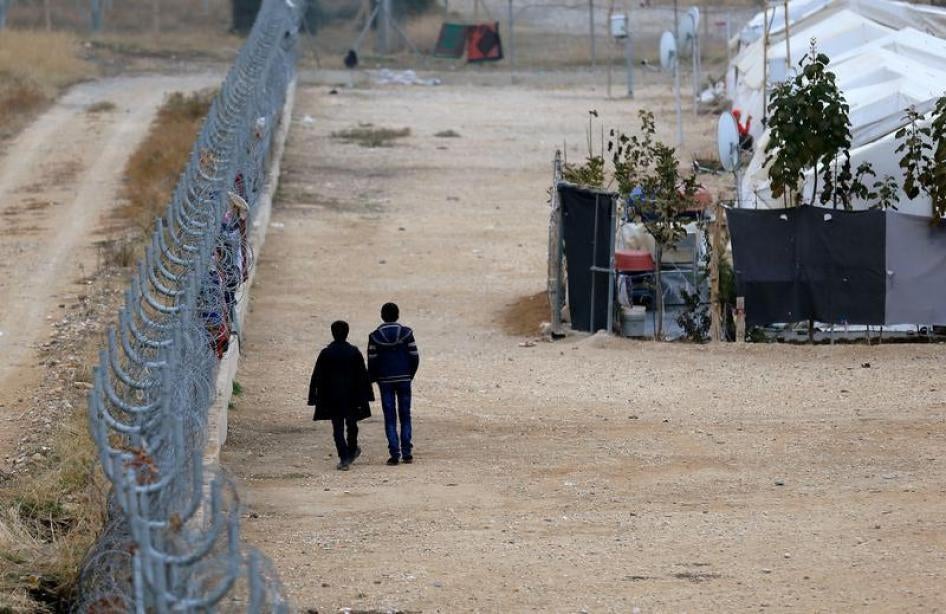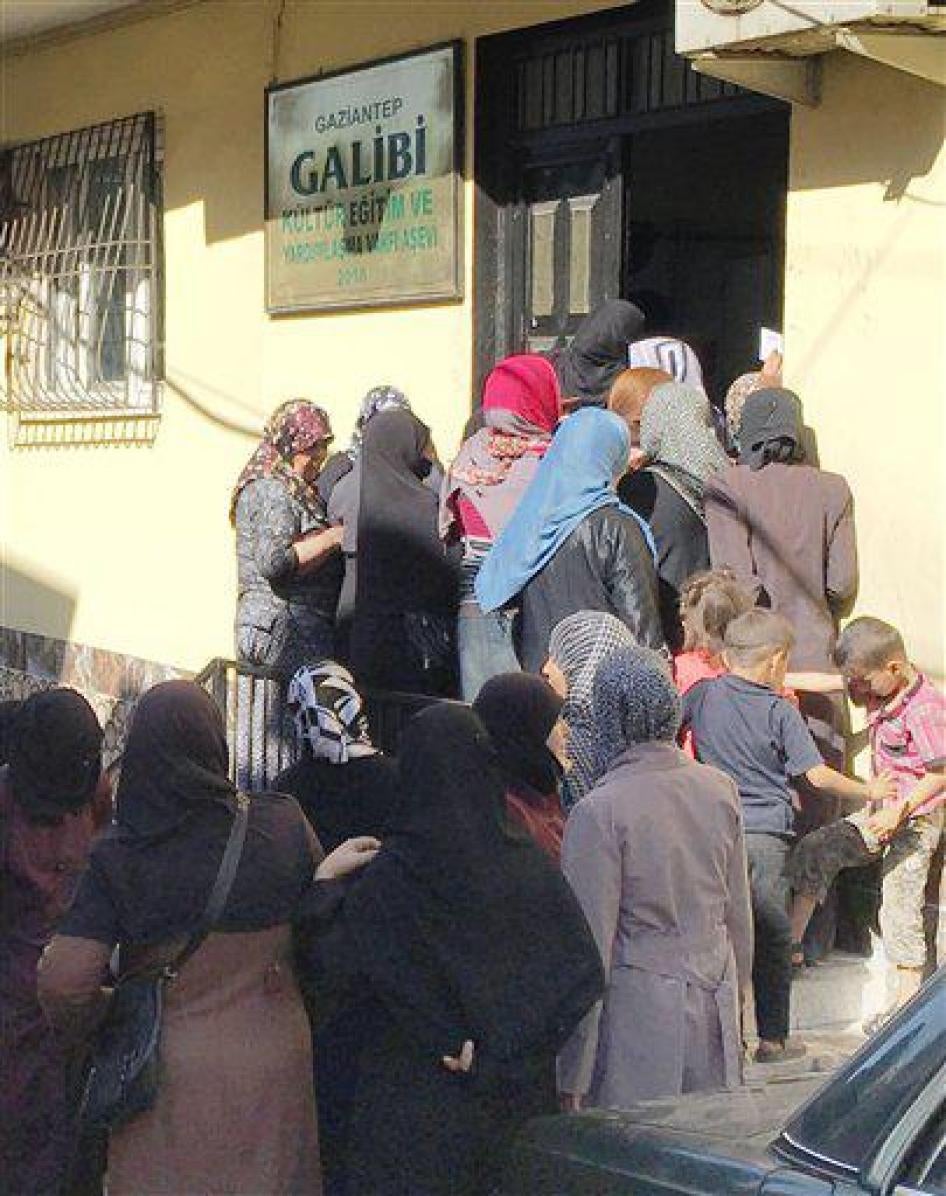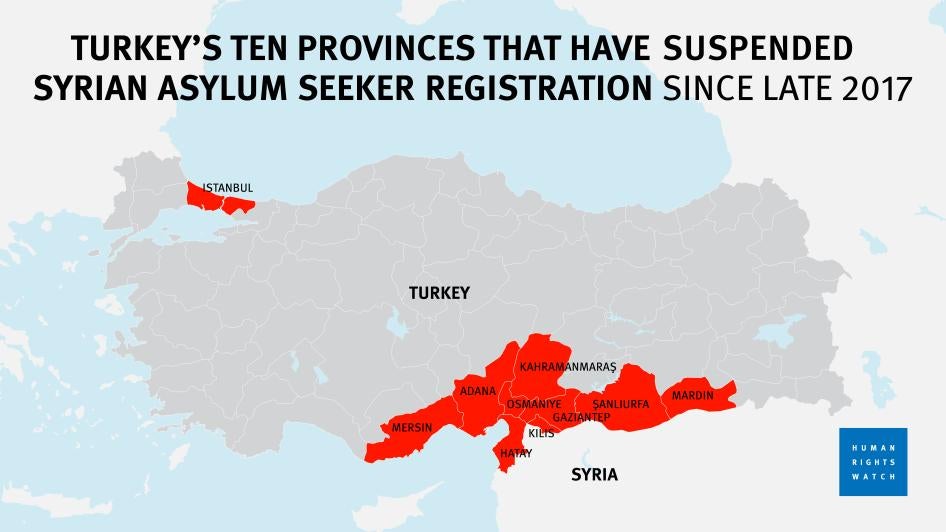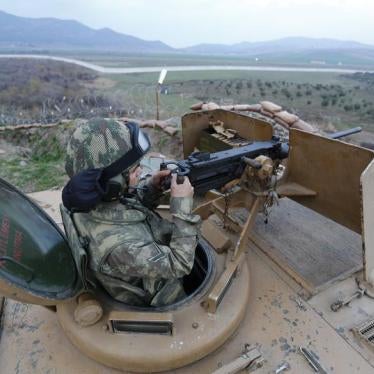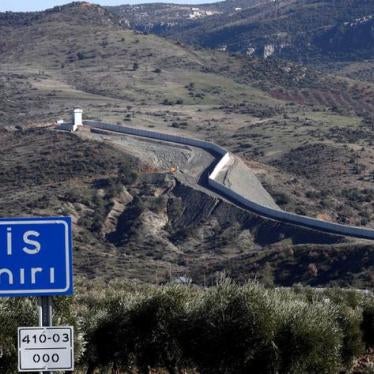(Istanbul) – Turkish authorities in Istanbul and nine provinces on or near the Syrian border have stopped registering all but a handful of recently arrived Syrian asylum seekers. The suspension is leading to unlawful deportations, coerced returns to Syria, and the denial of health care and education.
The European Commission has recently praised Turkey’s asylum system and plans to release the second batch of €3 billion under its March 2016 migration deal which includes support for refugees in Turkey. European Union institutions and governments have stayed publicly silent on the suspension and other refugee abuses committed by Turkey, suggesting their primary concern is to halt the movement of asylum seekers and migrants from Turkey to the EU.
“While the EU supports Turkey to deter asylum seekers from reaching Europe, it’s turning a blind eye to Turkey’s latest steps to block and discourage people fleeing Syria,” said Gerry Simpson, associate refugee program director at Human Rights Watch. “But forcing Syrians who manage to get past Turkey’s border guards to live in legal limbo only risks driving them underground and onward to the EU.”
The suspension of registration is Turkey’s latest effort to deny new asylum seekers protection. Over the past three years, Turkey has sealed off its border with Syria, while Turkish border guards continue to carry out mass summary pushbacks and to kill and injure Syrians as they try to cross.
Between early 2011 and the end of May 2018, Turkey had registered almost 3.6 million Syrians, making it the world’s largest refugee hosting country. That generosity does not absolve it, or its international partners, of the duty to help newly arrived asylum seekers, Human Rights Watch said.
In mid-May 2018, Human Rights Watch interviewed 32 Syrians in Turkey’s Hatay province about their attempts to register for a temporary protection permit in Hatay, Gaziantep, and Istanbul provinces. A permit protects Syrians from arrest and the risk of deportation. It also entitles them to get health care and education, to work, and to seek social assistance, including the EU-funded Emergency Social Safety Net for the most vulnerable Syrians.
Syrians said Turkish police deported them in groups of up to 20 people for not having a permit and that hospitals and schools refused to take them in without permits. Some said they returned to Syria so they, or their relatives, could get urgent medical care. Others said they decided to return to Syria because only some family members had been able to register. All said, they lived in constant fear of arrest and deportation and severely restricted their movement to avoid the police.
Turkey is bound by the international customary law rule of nonrefoulement, which prohibits the return of anyone in any manner whatsoever to a place where they would face a real risk of persecution, torture or other ill-treatment, or a threat to life. This includes asylum seekers, who are entitled to have their claims fairly adjudicated and not be summarily returned to places where they fear harm. Turkey may not coerce people into returning to places where they face harm by denying them legal status or access to essential services.
On October 30, 2017, the Hatay governor’s office said that to discourage smugglers from helping Syrians enter Turkey through Hatay, the province would no longer register newly arriving Syrians for temporary protection permits. In early February 2018, Turkey’s Interior Ministry said Istanbul province would also no longer register Syrians.
Eight other provinces on or near the Syrian border have also suspended registration for newly arriving Syrians since late 2017 or early 2018, according to three agencies working closely with Syrian refugees, as well as a European Commission official and a Turkish public official who previously worked on migration issues. The provinces are Adana, Gaziantep, Kahramanmaraş, Kilis, Mardin, Mersin, Osmaniye, and Şanlıurfa.
Since late August 2015, only registered Syrians who obtain a special travel permit have been allowed to travel within Turkey. In practice, the vast majority of Syrian asylum seekers enter Turkey irregularly through the few remaining gaps in Turkey’s border wall in Hatay province. Blocked from registering there, they are unable to lawfully leave Hatay province and travel to other provinces where registration has not been closed. This forces them to live illegally in Hatay province, or to use smugglers to reach other parts of Turkey, risking arrest and deportation.
According to three confidential sources, Turkey has rejected proposals for a new system that would allow Syrians arriving in Hatay, and to a far lesser extent in other border provinces, to register in other parts of Turkey where fewer refugees live.
Refugee agencies told Human Rights Watch that Turkey’s strict controls on international and local refugee agencies prevent them from finding and helping unregistered Syrians. This lack of aid agency monitoring means that there are no statistics or estimates on the numbers of Syrians denied registration, deported, or refused urgently needed services.
In response to a June 13 letter presenting the Human Rights Watch findings, the migration authorities in Ankara denied that any of the country’s 81 provinces, including Hatay and Istanbul, had suspended registration of Syrians. The United Nations High Commissioner for Refugees (UNHCR) told Human Rights Watch that as of mid-May, the authorities had reassured them that registration of Syrians was ongoing, including in Hatay and Istanbul. Other aid agencies that support refugees say that the authorities in the 10 provinces have only continued to process Syrians pre-registered at the time of the suspension, and to register urgent medical cases referred from Syria and babies born to registered Syrians in Turkey. Two refugee aid agencies also said that in some cases they have managed to convince the authorities in Hatay and Osmaniye provinces to register particularly vulnerable unregistered Syrians.
In early 2018, the authorities in Hatay opened a new registration center in Antakya. Representatives of three aid agencies and two Turkish security personnel working in Antakya said the center is exclusively for unregistered Syrians to request help to return to Syria, while registered Syrians can request help to return at other migration authority-run centers.
Turkey does not allow any independent monitoring of whether unregistered Syrians signing up for return are in fact returning voluntarily or whether they are effectively being coerced. In contrast, Turkey does allow independent monitoring of some registered Syrians’ decision to return to Syria.
Turkey should protect the basic rights of all newly arriving Syrians, regardless of registration status, and register those denied registration since late 2017. The European Commission and EU member states with embassies in Turkey should support Turkey to register and protect Syrians and press Turkey to allow all agencies working for refugees to freely assist and help protect all Syrians, including all unregistered Syrians.
“Unregistered Syrians in Turkey may be conveniently out of sight, but they shouldn’t be out of mind,” Simpson said. “EU states and the commission should speak up and support all Syrians in Turkey, not just those who got in before Turkey started driving them underground.”
Asylum Seeker Registration
The first Syrian refugees fled to Turkey in early 2011 and in the subsequent three-and-a-half years, Turkey adopted an ad hoc approach to their registration, without conferring a clear legal status with related rights. Although Turkey ratified the 1951 Refugee Convention and its 1967 Protocol, the country maintains a geographical limitation that excludes anyone not originally from a European country from full refugee recognition. That means it does not fully grant asylum to people fleeing violence or persecution in Syria and any other non-European country.
In 2013, Turkey adopted its own legal framework on the protection of asylum seekers and refugees. In October 2014, Turkey also adopted a regulation under which it grants Syrians temporary protection. As of June 28, 2018, Turkey said it had registered 3,562,523 people under the regulation. Registered Syrians are entitled to assistance. Even though the regulation says Syrians who fail to register will not be deported to Syria and will only face an “administrative fine,” Human Rights Watch found that unregistered Syrians have been deported for not having temporary protection permits.
The Hatay governor’s office and the interior minister said registration has been suspended for newly arriving Syrians in Hatay and Istanbul. Refugee aid agencies and Syrians in Hatay’s main city, Antakya, told Human Rights Watch that police carried out mass arrests of Syrians in November and early December, just after registration was suspended.
Five sources told Human Rights Watch that since late 2017 and early 2018, migration authorities in eight other border provinces followed suit and turned away all newly arriving Syrians seeking registration.
As of June 28, seven of the provinces that suspended registration were in the top 10 provinces hosting Syrians: Adana, Gaziantep, Hatay, Istanbul, Kilis, Mersin, and Şanlıurfa. Together they were sheltering 2,422,804 registered Syrians, or 68 percent of the total in Turkey. The other three – Kahramanmaraş, Mardin, and Osmaniye – were sheltering 235,549, or just under seven percent.
Aid agencies say that, in practice, the authorities in affected provinces continued to process Syrians pre-registered at the time of the suspension and to register people with urgent medical needs referred from Syria. They also continued to register babies born to registered Syrians in Turkey, an estimated 306 each day. Agencies with first-hand knowledge of the suspension of registration in the 10 provinces say the registration of these Syrians may explain the claim authorities made to Human Rights Watch that eight of the provinces on or near the border registered a total of 116,059 Syrians between November 1 and June 20.
One refugee aid agency with close knowledge of registration procedures in all of Turkey’s provinces told Human Rights Watch that in a few exceptional cases, authorities in Hatay and Osmaniye province have registered children in urgent need of medical care, together with one caregiver. Another refugee assistance agency that sometimes deals with unregistered Syrians said that between late 2017 and late April 2018, it had convinced the Hatay authorities to register a few dozen newly arrived Syrians on an exceptional basis because they had specific needs, but that even then it was a “headache” to get them through police checkpoints to registration offices. Agencies estimate that as of mid-May, the total number of such vulnerable cases of unregistered Syrians whom the authorities have registered on an exceptional basis was in the low hundreds.
Turkey’s travel permit system for registered Syrians prohibits unregistered Syrians from traveling from border provinces to register elsewhere. Seven Syrians told Human Rights Watch they paid smugglers to drive them from Antakya, in Hatay province, to Istanbul to register. But security officials at migration authority offices in Istanbul told them registration had been suspended for newly arriving Syrians.
UNHCR and some diplomats in Turkey told Human Rights Watch they have been encouraging Turkey’s Directorate General for Migration Management to adopt a referral system under which authorities in Hatay, or other border provinces where Syrians first arrive, would pre-register Syrians and then refer them to other provinces where fewer Syrians live to register. Some EU member states have proposed that if such a system were to be adopted, the EU should help support job-creation for Syrians and Turkish citizens in the provinces to which Syrians are referred. But all attempts to convince Turkey to set up a referral system have failed.
Consequences of Suspended Registration
In mid-May 2018, Human Rights Watch interviewed 32 Syrian asylum seekers in Antakya, the capital of Hatay Province, and the first city most Syrians reach after being smuggled across the closed Turkish border. They said the authorities in Antakya, the nearby town of Reyhanli, and in Gaziantep province had refused to register them during the first few months of 2018. They also described how not having a temporary protection permit – or “kimlik,” as it is popularly called (a Turkish shorthand for identification card) – had affected them. Human Rights Watch explained the purpose of the interviews, gave assurances of anonymity, and obtained interviewees’ consent to describe their experiences.
All said they were turned away from registration offices at least twice. Only three said they managed to register after brokers bribed registration officials between US$300 and $500.
Most said officials simply said “no more kimliks here” or “no one gets a kimlik” and told them to leave. Two said they also tried to register in Gaziantep in April, but that saw a sign on the office that said “no kimliks.”
Four said that only some members of their family had been registered, leaving the rest in legal limbo and that as a result, the entire family was contemplating returning to Syria. One man said his sick wife was given permission to enter Turkey for emergency medical treatment in Antakya, and was allowed to register there, together with their newborn baby. When he and their five other children, aged 6 to 14, managed to enter Turkey and tried to register in Antakya, they were turned away.
Three Syrians said that Turkish police had previously summarily deported them to Syria for not having a temporary protection permit. One, a 22-year-old man from Aleppo governorate, said he entered Turkey in early April and was refused registration in Antakya. In early May, he said, police stopped him at about 8 a.m. near the Antakya bus station and asked for his permit. When he said he tried to register, but had been turned away, the police drove him to a local police station, recorded his personal details, and then drove him and about 20 other unregistered Syrians to the Bab al-Hawa border crossing and deported them. He said 15 of the 20 told him they had been caught without temporary protection permits in Istanbul and the other five said they had just entered Turkey a few days earlier and were arrested after arriving at a smuggler’s house in Antakya. A few days later, he managed to return to Turkey with smugglers.
Another former deportee, a 28-year-old man from Idlib, said he and his brother entered Turkey together in January and were denied registration in Antakya. He said his brother traveled with a smuggler to Istanbul to find work there, but Turkish police arrested him on May 17 and the next day, took him to the Bab al-Hawa border crossing and deported him.
On May 22, Human Rights Watch spoke to a 31-year-old man from Hama who said the authorities in Antakya had arrested his brother a few hours earlier, were holding him in the new center for unregistered Syrians to sign up to return to Syria, and said they were about to deport him. Human Rights Watch alerted UNHCR, which intervened and prevented the deportation.
Human Rights Watch interviewed four Syrians at the newly established center for unregistered Syrians who wish to sign up for return to Syria. They decided to go back because their relatives had been denied urgent medical care, or because some family members who arrived after registration was suspended could not register.
Two Syrians said they heard from other Syrians in Antakya about many cases in which the wives of men who had been deported told Turkish authorities they planned to go back to Syria because they and their children could not survive alone in Turkey.
All of the 29 other unregistered Syrians interviewed said they lived in constant fear of arrest and deportation and said they heard of many cases involving the deportation of unregistered Syrians. Eight said they reduced their movements to a minimum, often staying at home for days at a time. A 17-year-old boy who said he never left his uncle’s house in Antakya out of fear of arrest said “this feels like prison.”
Three unregistered Syrians said they regularly use Syrian-owned driving services which use back roads to avoid police checkpoints or informal police stop-and-search patrols in Antakya.
Nine said they attempted to get medical treatment in clinics and hospitals in Antakya, but had been refused treatment because they were not registered. Four others said they did not even try to access medical care, because they heard others were turned away, and because they were afraid local hospitals would call the police to arrest them for not having a permit.
A 27-year-old woman from Idlib province seeking cancer treatment said two hospitals in Antakya refused to treat her because she did not have a permit.
A 34-year-old, eight months’ pregnant woman from Aleppo, with four children all born by caesarean section, said she was too afraid to go to the local hospital to ask for a checkup and prepare for her delivery, because she had been told hospitals turn away unregistered Syrians and was afraid of being arrested and returned to Syria.
Similarly, a 31-year-old woman whose entire family was refused registration in March said her husband was extremely sick with a serious lung condition, but he would not go to a hospital out of fear of being arrested and deported. She said he never left the house and lived in constant fear of being discovered.
A nongovernmental organization working with Syrians in Hatay province said that during the first few months of 2018, they heard of dozens of cases of Syrians in Antakya seeking emergency medical care, many of them pregnant women, who were turned away by hospitals because they had been denied registration.
Six Syrians interviewed by Human Rights Watch said their children were unable to go to school, because schools would only take registered Syrians.
Nowhere to Turn for Help
The Turkish authorities consider Syrians denied registration to be in the country unlawfully. Nongovernmental groups working with refugees said the government only allows them to work with lawfully present asylum seekers and refugees.
Six organizations working with refugees in Turkey’s provinces on the Syrian border – which asked to remain anonymous for the staff’s security – said Turkey strictly controls and monitors their work in various ways.
Some said they must get special permission to assess registered Syrians’ assistance needs or to visit registered Syrians’ homes, in some cases in the presence of staff from the Ministry of Family and Social Policies. The agencies said the rules are applied in an ad hoc and unpredictable way, depending on the local authorities, and they are never certain of what refugee outreach activities are allowed.
As a result, they said, they found it difficult to identify Syrians blocked from registration procedures, including the most vulnerable, for example those in urgent need of medical or other care. They also said the situation in Hatay province – through which almost all newly arriving Syrians using smugglers enter the country due to continued gaps in the border wall – is particularly sensitive.
Because of the restrictions imposed by the Turkish authorities, aid agencies said they cannot proactively identify unregistered Syrian refugees. At best, they can only react if they are made aware of unregistered Syrians who are seeking help, or if they come across them by chance. They said they sometimes raise the most vulnerable of such cases with the authorities in the hope that they will allow those in urgent need to register.
One agency working in the border areas said: “It’s very simple, we can’t just reach out to registered or unregistered Syrians. We need approval for everything and we’d never get approval to help unregistered Syrians.” Another agency worker said: “We have repeatedly asked the authorities for permission to do protection outreach work, but we’ve been refused every time.”
Agencies said their extremely limited contact with unregistered Syrians means they can neither estimate how many unregistered Syrians now live in Hatay and other provinces, nor the extent to which the registration suspension has led to deportation and denial of service access. EU member states and other donors funding Syrian refugee assistance and protection projects in Turkey therefore don’t know the extent to which Turkey’s registration suspension is excluding Syrians from receiving help.
European Union Remains Silent
EU member states and the European Commission have remained publicly silent on Turkey’s registration suspension, as they have on Turkey’s long-standing abuses against Syrian asylum seekers at the border.
Turkey’s suspension of registration could drive many Syrians underground and onward to the EU, or coerce them into going back to Syria. The suspension, Turkey’s ongoing border abuses, and its recent abuses against Afghan asylum seekers means that any attempts to return Syrians from Greece to Turkey is also likely to be met with significant resistance by lawyers challenging return attempts on the grounds that Turkey is not a safe third country to which to return asylum seekers.
On April 17, the European Commission released its latest update on whether Turkey is meeting the EU’s criteria for becoming an EU member state. As part of its assessment of Turkey’s asylum system, the commission said: “There have been reports of alleged expulsions, returns and deportations of Syrian nationals, in contradiction of the non-refoulement principle,” without going into any further details or citing the sources.
In March, the European Commission promised to release the second batch of €3 billion under its March 2016 deal with Turkey. Under the deal, the EU maintains that Turkey is a safe country to which to return Syrian asylum seekers. In fact, Turkey does not meet the EU safe third country criteria.
Recommendations
Turkey should resume temporary protection registration for all newly arriving Syrians and register those denied access to registration since late 2017. If necessary, Turkey should pre-register Syrians in its provinces on the Syrian border and require Syrians to move to, and live in, other provinces with fewer Syrians. In the meantime, Turkey should instruct all medical facilities to provide emergency medical treatment to any Syrian in need, regardless of registration status. Schools should also take in Syrian children pending their registration. All Turkish public officials should refer unregistered Syrians to the nearest registration center.
Turkey should also allow all refugee agencies working with Syrians to actively work to identify unregistered Syrians, help them access registration procedures, and raise with the authorities all cases of unregistered Syrians deported to Syria or denied access to health care and education.
To help ensure protection for Syrians in Turkey, the European Commission and EU member states with embassies in Turkey should press Turkey to resume registration of all newly arriving Syrians and guarantee their access to health care and education in line with existing policies. If Turkey requires help to resume registration, they should respond generously. They should also press Turkey to allow all agencies working with refugees to freely carry out protection monitoring work throughout Turkey to identify and assist unregistered Syrians and to publicly report on any abuses, including forced return to Syria, and denial of assistance.
Finally, the European Commission should proactively seek information and publicly report on credible accounts of killings, injuries, and mass deportations by Turkish security forces at the Syrian border, including in its regular reports on Turkey’s accession process and the European Agenda on Migration.
